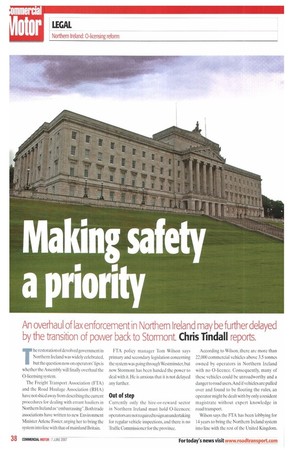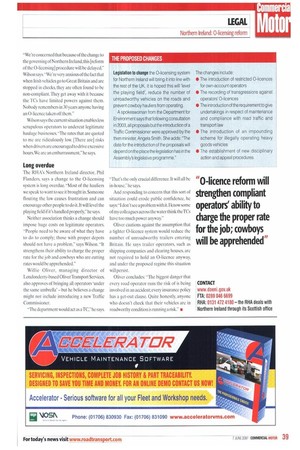Making safe a priority
Page 38

Page 39

If you've noticed an error in this article please click here to report it so we can fix it.
An overhaul of lax enforcement in Northern Ireland may be further delayed by the transition of power back to Stormont. Chris Tindall reports.
The restoration of devolved government in Northern Ireland was widely celebrated, but the question now on operators lips is whether the Assembly will finally overhaul the 0-licensing system.
The Freight Transport Association (FTA) and the Road Haulage Association (RHA) have not shied away from describing the current procedures for dealing with errant hauliers in Northern Ireland as "embarrassing". Both trade associations have written to new Environment Minister Arlene Foster, urging her to bring the system into line with that of mainland Britain. FTA policy manager Tom Wilson says primary and secondary legislation concerning the system was going through Westminster,but now Stormont has been handed the power to deal with it. He is anxious that it is not delayed any further.
Out of step
Currently only the hire-or-reward sector in Northern Ireland must hold 0-licences; operators are not required to sign an undertaking for regular vehicle inspections, and there is no Traffic Commissioner for the province. According to Wilson, there arc more than 22,000 commercial vehicles above 3.5 tonnes owned by operators in Northern Ireland with no 0-licence. Consequently, many of these vehicles could be unroadworthy and a danger to road users.And if vehicles are pulled over and found to be flouting the rules, an operator might be dealt with by only a resident magistrate without expert knowledge in road transport.
Wilson says the FTA has been lobbying for 14 years to bring the Northern Ireland system into line with the rest of the United Kingdom. "We're concerned that because of the change to the governing of Northern Ireland,this [reform of the 0-licensing] procedure will be delayed," Wilson says. "We're very anxious of the fact that when Irish vehicles go to Great Britain and are stopped in checks, they are often found to be non-compliant. They get away with it because the TCs have limited powers against them. Nobody remembers in 30 years anyone having an 0-licence taken off them."
Wilson says the current situation enables less scrupulous operators to undercut legitimate haulage businesses. "The rates that are quoted to me are ridiculously low. [There are] risks when drivers are encouraged to drive excessive hours. We are an embarrassment," he says.
Long overdue The IZH A's Northern Ireland director, Phil Flanders, says a change to the 0-licensing system is long overdue. "Most of the hauliers we speak to want to see it brought in. Someone flouting the law causes frustration and can encourage other people to do it. It will level the playing field if it's handled properly," he says Neither association thinks a change should impose huge costs on legitimate operators. -People need to be aware of what they have to do to comply; those with proper depots should not have a problem," says Wilson. "It strengthens their ability to charge the proper rate for the job and cowboys who are cutting rates would he apprehended."
Willie Oliver, managing director of Londonderry-based Oliver Transport Services, also approves of bringing all operators 'under the same umbrella' — but he believes a change might not include introducing a new Traffic Commissioner.
"The department would act as a TC," he says. "That's the only crucial difference. It will all be in-house," he says.
And responding to concern that this sort of situation could erode public confidence, he says:"I don't see a problem with it. I know some of my colleagues across the water think the TCs have too much power anyway."
Oliver cautions against the assumption that a tighter 0-licence system would reduce the number of unroadworthy trailers entering Britain. He says trailer operators, such as shipping companies and clearing houses, are not required to hold an 0-licence anyway, and under the proposed regime this situation will persist.
Oliver concludes; "The biggest danger that every road operator runs the risk of is being involved in an accident; every insurance policy has a get-out clause. Quite honestly, anyone who doesn't check that their vehicles are in roadworthy condition is running a risk."• CONTACT
www.tioeni.gov.uk
FTA: 0289 046 6699 RHA: 0131 472 4180— the RHA deals with Northern Ireland through its Scottish office






















































































































































































